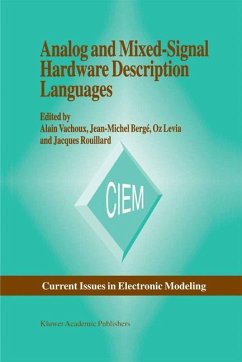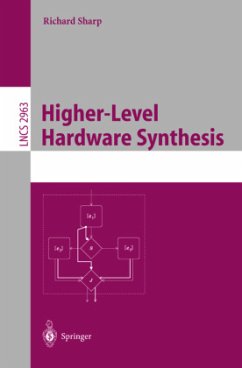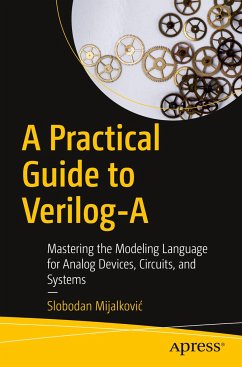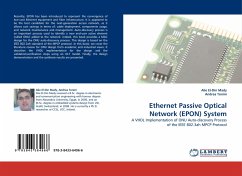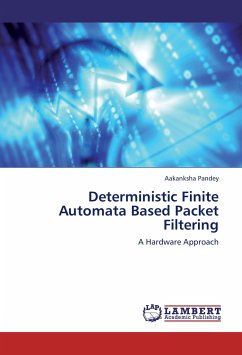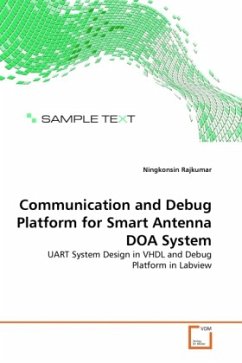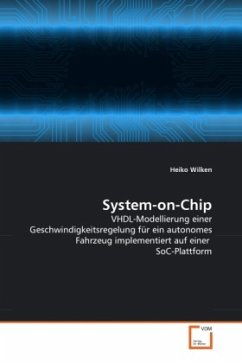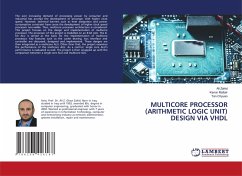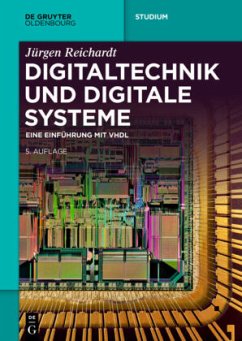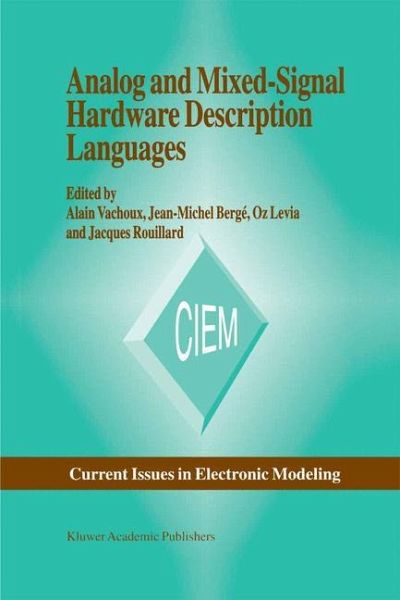
Analog and Mixed-Signal Hardware Description Language

PAYBACK Punkte
38 °P sammeln!
Hardware description languages (HDL) such as VHDL and Verilog have found their way into almost every aspect of the design of digital hardware systems. Since their inception they gradually proved to be an essential part of modern design methodologies and design automation tools, ever exceeding their original goals of being description and simulation languages. Their use for automatic synthesis, formal proof, and testing are good examples. So far, HDLs have been mainly dealing with digital systems. However, integrated systems designed today require more and more analog parts such as A/D and D/A...
Hardware description languages (HDL) such as VHDL and Verilog have found their way into almost every aspect of the design of digital hardware systems. Since their inception they gradually proved to be an essential part of modern design methodologies and design automation tools, ever exceeding their original goals of being description and simulation languages. Their use for automatic synthesis, formal proof, and testing are good examples.
So far, HDLs have been mainly dealing with digital systems. However, integrated systems designed today require more and more analog parts such as A/D and D/A converters, phase locked loops, current mirrors, etc.
The verification of the complete system therefore asks for the use of a single language. Using VHDL or Verilog to handle analog descriptions is possible, as it is shown in this book, but the real power is coming from true mixed-signal HDLs that integrate discrete and continuous semantics into a unified framework. Analog HDLs (AHDL) are considered here a subset of mixed-signal HDLs as they intend to provide the same level of features as HDLs do but with a scope limited to analog systems, possibly with limited support of discrete semantics.
Analog and Mixed-Signal Hardware Description Languages covers several aspects related to analog and mixed-signal hardware description languages including:
The use of a digital HDL for the description and the simulation of analog systems The emergence of extensions of existing standard HDLs that provide true analog and mixed-signal HDLs.
The use of analog and mixed-signal HDLs for the development of behavioral models of analog (electronic) building blocks (operational amplifier, PLL) and for the design of microsystems that do not only involve electronic parts.
The use of a front-end tool that eases the description task with the help of a graphical paradigm, yet generating AHDL descriptions automatically.
Analog and Mixed-Signal Hardware Description Languages is the first book to show how to use these new hardware description languages in the design of electronic components and systems. It is necessary reading for researchers and designers working in electronic design.
So far, HDLs have been mainly dealing with digital systems. However, integrated systems designed today require more and more analog parts such as A/D and D/A converters, phase locked loops, current mirrors, etc.
The verification of the complete system therefore asks for the use of a single language. Using VHDL or Verilog to handle analog descriptions is possible, as it is shown in this book, but the real power is coming from true mixed-signal HDLs that integrate discrete and continuous semantics into a unified framework. Analog HDLs (AHDL) are considered here a subset of mixed-signal HDLs as they intend to provide the same level of features as HDLs do but with a scope limited to analog systems, possibly with limited support of discrete semantics.
Analog and Mixed-Signal Hardware Description Languages covers several aspects related to analog and mixed-signal hardware description languages including:
The use of a digital HDL for the description and the simulation of analog systems The emergence of extensions of existing standard HDLs that provide true analog and mixed-signal HDLs.
The use of analog and mixed-signal HDLs for the development of behavioral models of analog (electronic) building blocks (operational amplifier, PLL) and for the design of microsystems that do not only involve electronic parts.
The use of a front-end tool that eases the description task with the help of a graphical paradigm, yet generating AHDL descriptions automatically.
Analog and Mixed-Signal Hardware Description Languages is the first book to show how to use these new hardware description languages in the design of electronic components and systems. It is necessary reading for researchers and designers working in electronic design.



